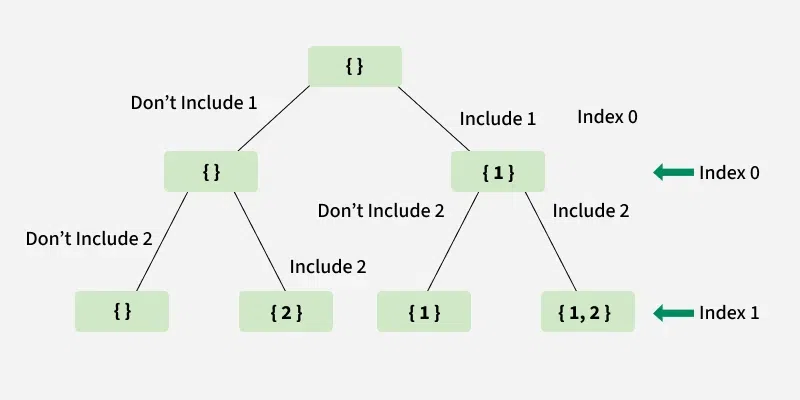Generating all possible Subsequences using Recursion including the empty one.
Last Updated :
11 Jul, 2025
Given an array arr[]. The task is to find all the possible subsequences of the given array using recursion.
Examples:
Input: arr[] = [1, 2, 3]
Output : [3], [2], [2, 3], [1], [1, 3], [1, 2], [1, 2, 3], []
Input: arr[] = [1, 2]
Output : [2], [1], [1, 2], []
Approach:
For every element in the array, there are two choices, either to include it in the subsequence or not include it. Apply this for every element in the array starting from index 0 until we reach the last index. Print the subsequence once the last index is reached.
The below diagram shows the recursion tree for array, arr[] = [1, 2].
 C++
C++
// C++ code to find all possible
// subsequences for given array using
// recursion
#include <bits/stdc++.h>
using namespace std;
void findSubsequences(int curr, vector<int> &arr,
vector<int> &subarr, vector<vector<int>> &res) {
// Base case: When we reach the end of the array,
// add the current subsequence to the result
if (curr == arr.size()) {
res.push_back(subarr);
return;
}
// Include the current element in the subsequence
subarr.push_back(arr[curr]);
// Recurse to the next element
findSubsequences(curr + 1, arr, subarr, res);
// Backtrack: Remove the current element and explore
// the next possibility
subarr.pop_back();
// Do not include the current element
// in the subsequence
findSubsequences(curr + 1, arr, subarr, res);
}
int main() {
vector<int> arr = {1, 2, 3};
int n = arr.size();
vector<int> subarr;
vector<vector<int>> res;
findSubsequences(0, arr, subarr, res);
for (int i = 0; i < res.size(); i++) {
for (int j = 0; j < res[i].size(); j++) {
cout << res[i][j] << " ";
}
cout << endl;
}
return 0;
}
// Java code to find all possible
// subsequences for given array using
// recursion
import java.util.*;
class GfG {
static void findSubsequences(int curr, int[] arr,
List<Integer> subarr,
List<List<Integer> > res) {
// Base case: When we reach the end of the array,
// add the current subsequence to the result
if (curr == arr.length) {
res.add(new ArrayList<>(
subarr));
return;
}
// Include the current element in
// the subsequence
subarr.add(arr[curr]);
// Recurse to the next element
findSubsequences(
curr + 1, arr, subarr,
res);
// Backtrack: Remove the current element and explore
// the next possibility
subarr.remove(subarr.size() - 1);
// Do not include the current
// element in the subsequence
findSubsequences(
curr + 1, arr, subarr,
res);
}
public static void main(String[] args) {
int[] arr = { 1, 2, 3 };
List<Integer> subarr = new ArrayList<>();
List<List<Integer> > res = new ArrayList<>();
findSubsequences(0, arr, subarr, res);
for (List<Integer> subsequence : res) {
for (int num : subsequence) {
System.out.print(num + " ");
}
System.out.println();
}
}
}
# Python program to find all possible
# subsequences for given array using
# recursion
def findSubsequences(curr, arr, subArr, res):
# Base case: When we reach the end of the array,
# add the current subsequence to the result
if curr == len(arr):
res.append(subArr.copy())
return
# Include the current element in the subsequence
subArr.append(arr[curr])
# Recurse to the next element
findSubsequences(curr + 1, arr, subArr, res)
# Backtrack: Remove the current element and
# explore the next possibility
subArr.pop()
# Do not include the current element in the subsequence
findSubsequences(curr + 1, arr, subArr, res)
if __name__ == "__main__":
arr = [1, 2, 3]
# Temporary list to store the
# current subsequence
subArr = []
# Resultant list to store all subsequences
res = []
# Call the function to find all subsequences
# starting from index 0
findSubsequences(0, arr, subArr, res)
for subsequence in res:
print(" ".join(map(str, subsequence)))
// C# code to find all possible
// subsequences for given array using
// recursion
using System;
using System.Collections.Generic;
class GfG {
static void findSubsequences(int curr, int[] arr,
List<int> subArr,
List<List<int> > res) {
// Base case: When we reach the end of the array,
// add the current subsequence to the result
if (curr == arr.Length) {
res.Add(new List<int>(subArr));
return;
}
// Include the current element in
// the subsequence
subArr.Add(arr[curr]);
// Recurse to the next element
findSubsequences(curr + 1, arr, subArr, res);
// Backtrack: Remove the current element and explore
// the next possibility
subArr.RemoveAt(subArr.Count - 1);
// Do not include the current
// element in the subsequence
findSubsequences(curr + 1, arr, subArr, res);
}
static void Main() {
int[] arr = { 1, 2, 3 };
// Temporary list to store the current subsequence
List<int> subArr = new List<int>();
// Resultant list to store all subsequences
List<List<int> > res = new List<List<int> >();
// Call the function to find all subsequences
// starting from index 0
findSubsequences(0, arr, subArr, res);
foreach(var subsequence in res) {
Console.WriteLine(
string.Join(" ", subsequence));
}
}
}
// JavaScript code to find all possible
// subsequences for given array using
// recursion
function findSubsequences(curr, arr, subArr, res) {
// Base case: When we reach the end of the array, add
// the current subsequence to the result
if (curr === arr.length) {
res.push([...subArr ]);
return;
}
// Include the current element in the
// subsequence
subArr.push(arr[curr]);
// Recurse to the next element
findSubsequences(curr + 1, arr, subArr, res);
// Backtrack: Remove the current element and explore the
// next possibility
subArr.pop();
// Do not include the current element in
// the subsequence
findSubsequences(curr + 1, arr, subArr, res);
}
const arr = [ 1, 2, 3 ];
let subArr = [];
let res = [];
findSubsequences(0, arr, subArr, res);
res.forEach(subsequence => {
console.log(subsequence.join(
" "));
});
Output1 2 3
1 2
1 3
1
2 3
2
3
Time complexity: O(2^n)
Auxiliary Space: O(n)
Related article:
Explore
DSA Fundamentals
Data Structures
Algorithms
Advanced
Interview Preparation
Practice Problem